BOONE, N.C. — Whether you’re an aspiring geologist or a mountain biker, a budding archaeologist or a kayaker, Appalachian State University and its Blue Ridge Mountains setting likely offer an adventure — both academic and recreational — for every lover of the great outdoors.
Peterson’s — the world’s leading educational services company — named Appalachian in its “The 20 Best Colleges for Outdoor Enthusiasts” list, published May 1. The university placed as No. 13 out of the 20 recognized schools nationwide, which were ranked based on their proximity to the outdoors, as well as the academic and recreational opportunities they provide.
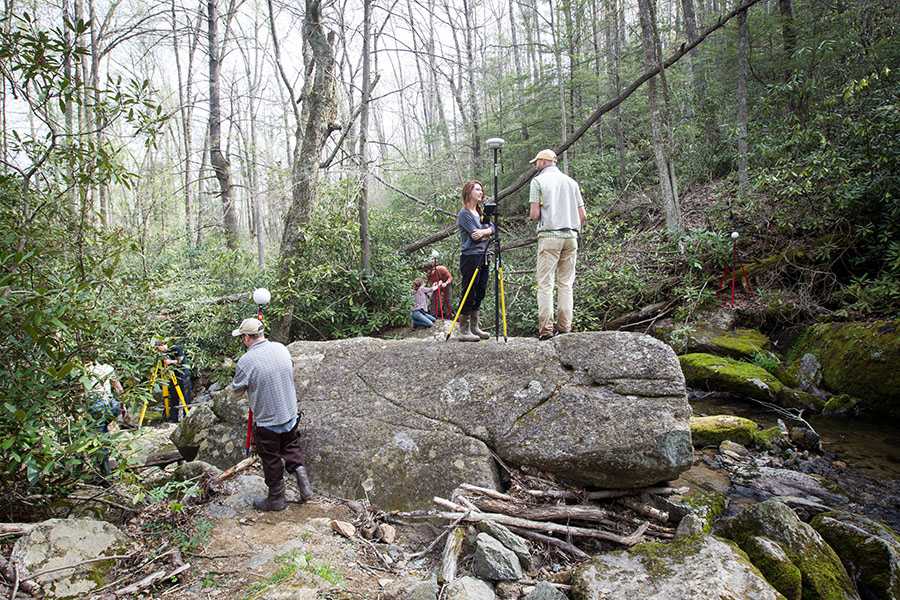
Appalachian geography students and faculty complete a surveying project at Goshen Creek, located off the Blue Ridge Parkway. This is just one of many environmental research opportunities that make the area a “backyard laboratory,” according to Dr. Jeff Colby, professor in Appalachian’s Department of Geography and Planning. Photo by Marie Freeman
A research-rich environment
“The Southern Appalachian region represents the center of biodiversity for many plants and animals in North America and also has the highest forest coverage. The presence of watersheds, rivers, forests, rock outcrops and highly diverse animal and plant communities, essentially in our backyard, can be thought of as a natural laboratory,” said Dr. Ece Karatan, professor in Appalachian’s Department of Biology and incoming vice provost for research.
“Faculty members from diverse disciplines, including biology, chemistry, physics, geological and environmental sciences, and geography and planning take advantage of the unique location of Appalachian in their research programs. Courses in many Appalachian departments incorporate opportunities to study these natural resources and … provide unparalleled hands-on learning opportunities for students.”
The varied terrain that surrounds Appalachian in the Western North Carolina region — from mountains to meadows, along with the area’s waterways, is rife with research opportunities for the university’s students and faculty. Additionally, the wildlife and vegetation native to the High Country make for diverse research subjects.
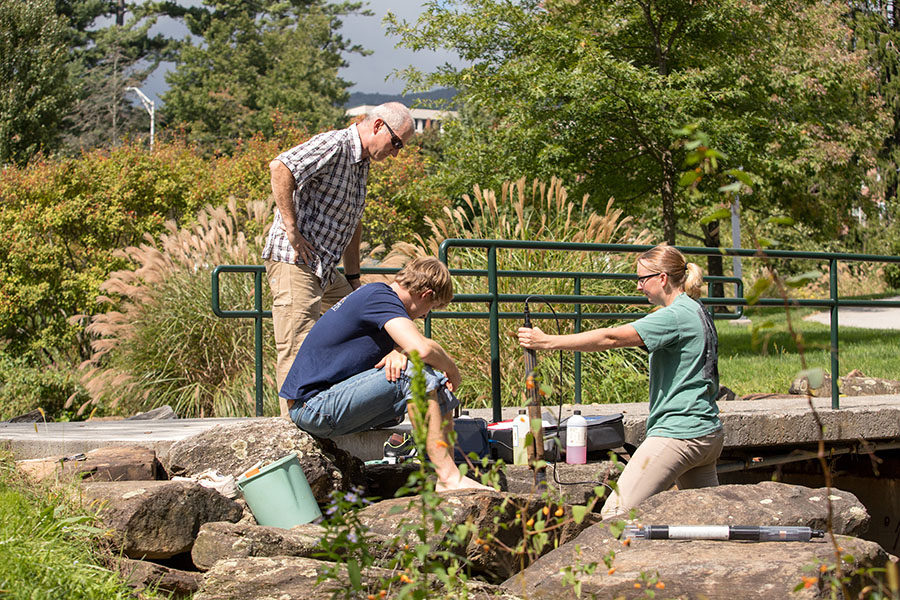
Dr. Shea Tuberty, professor in and assistant chair of Appalachian’s Department of Biology, far left, works with biology graduate students Grant Buckner, of Burnsville, center, and Cristina Sanders, of Taylorsville, to collect water samples from Boone Creek. Their water quality studies are among the many campus research and creative endeavors that address issues or concerns within the High Country area, benefitting the region while providing students with skills that are sought after from both employers and graduate programs. Photo by Marie Freeman
Myriad outdoor research projects are in progress at Appalachian year-round. Recent projects include a Beemon hive monitoring system to understand the health and behavior of honeybees and the development of an outdoor recreation database through a partnership between Appalachian’s Healthy Outdoor Play and Exercise (HOPE) Lab and Park Rx America.
For those students who are interested in pursuing career fields that engage with the outdoors, Appalachian offers several degree programs in environmental studies and recreation management. The following are just a few examples:
- Biology–ecology, evolution and environmental biology.
- Environmental science.
- Geography.
- Geology.
- Recreation management–outdoor experiential education.
- Recreation management–recreation and park management.
- Sustainable development–environmental studies.
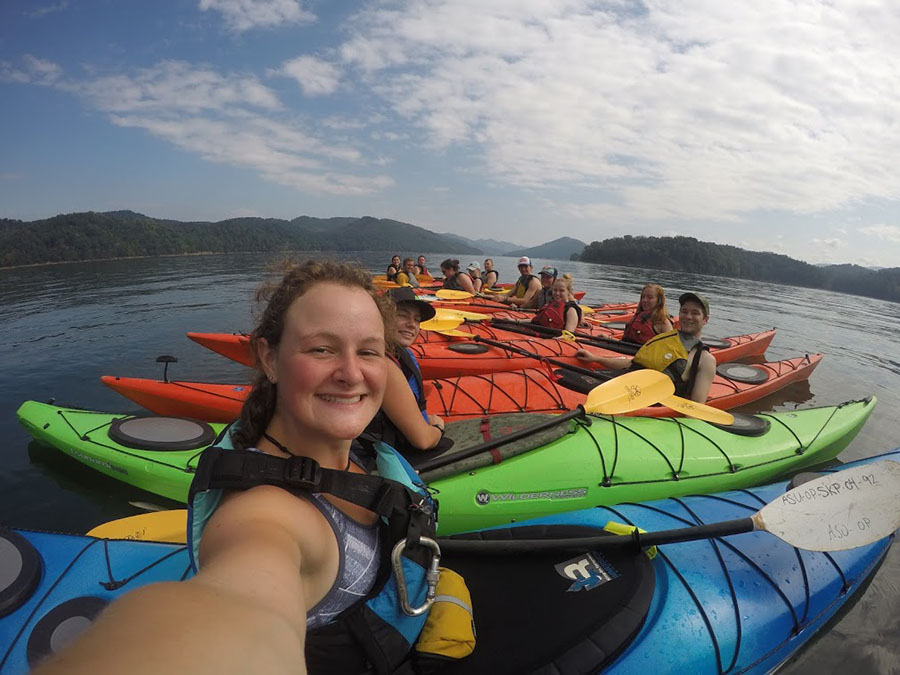
Appalachian students participating in the university's Outdoor Programs take a kayak tour of Watauga Lake in nearby Elizabethton, Tennessee, in fall 2018. Rebecca Ploener, a senior psychology major from Hockessin, Delaware, who works as a trip leader for Outdoor Programs, is pictured in the foreground. Photo submitted
Learning through outdoor exploration
The Western North Carolina region is home to the more than 100 miles of biking and hiking trails, some of the highest peaks east of the Mississippi River, including the approximately 6,884-foot Mount Mitchell, and, according to the National Park Service, one of the oldest rivers in the world — the 320-mile New River.
In its online list, Peterson’s highlighted Appalachian’s Outdoor Programs, which is part of the university’s Division of Student Affairs. Outdoor Programs offers outdoor gear rentals at affordable prices and a variety of different outdoor adventures for Appalachian students, as well as faculty, staff and their immediate family.
“Many students list the outdoor location (of Boone) as one of the reasons they choose to attend Appalachian,” said Rich Campbell ’90 ’96, associate director of Appalachian’s Outdoor Programs. “Our program serves as an easy and affordable way to discover some of these amazing outdoor resources found in our community.”
Campbell, who holds a B.S. in recreation management and an M.A. in student development from Appalachian, said Outdoor Programs participants have traveled extensively throughout North Carolina and the Southeast, exploring both the state and region by hiking, backpacking, rock climbing, caving, whitewater rafting and kayaking, stand-up paddle boarding, canoeing and kayaking.
“By participating in our programs, students learn more about themselves. We offer opportunities to challenge students, in a supportive atmosphere, and that allows for significant growth and development,” he said. “Through those challenges, students develop an ability to persevere, manage adversity and achieve success — skills often found through hard work.”
What do you think?
Share your feedback on this story.
About the Division of Academic Affairs
The Division of Academic Affairs at Appalachian State University is dedicated to fostering student success, cultivating innovation and preparing students to lead purposeful lives — upholding the university’s longstanding tradition of service and leadership. Through its integrated efforts across academic programs, student support services, enrollment management and arts engagement, the division ensures App State provides a holistic and enriching educational journey for all Mountaineer students. Academic Affairs encompasses the degree-granting College of Arts and Sciences, College of Fine and Applied Arts, Beaver College of Health Sciences, Reich College of Education, Walker College of Business, Hayes School of Music and University College, as well as the Williams School of Graduate Studies, the Honors College and 10 other units — including Student Affairs, Enrollment Management, and Arts Engagement and Cultural Resources — that support the innovative, interdisciplinary and integrative Appalachian Experience. Learn more at https://academicaffairs.appstate.edu.
About Student Affairs at App State
Student Affairs at App State supports student success and well-being by fostering a culture of care, inclusion and engagement. Its mission is to develop lifelong learners and dynamic leaders through meaningful experiences that challenge and support students. Grounded in a commitment to care, engage and transform, Student Affairs creates a student-centered environment that encourages resilience, leadership, service and global learning. Student Affairs encompasses the following units: Campus Activities, Case Management, the Child Development Center, Community-Engaged Leadership, Counseling and Psychological Services, Office of the Dean of Students, New Mountaineer and Family Engagement, Off-Campus Student Services, Plemmons Student Union, Student Conduct, M.S. Shook Student Health Service, Student Legal Services, Student Veteran Services, University Recreation, and Wellness and Prevention Services. Learn more at https://studentaffairs.appstate.edu.
About Appalachian State University
As a premier public institution, Appalachian State University prepares students to lead purposeful lives. App State is one of 17 campuses in the University of North Carolina System, with a national reputation for innovative teaching and opening access to a high-quality, cost-effective education. The university enrolls more than 21,000 students, has a low student-to-faculty ratio and offers more than 150 undergraduate and 80 graduate majors at its Boone and Hickory campuses and through App State Online. Learn more at https://www.appstate.edu.

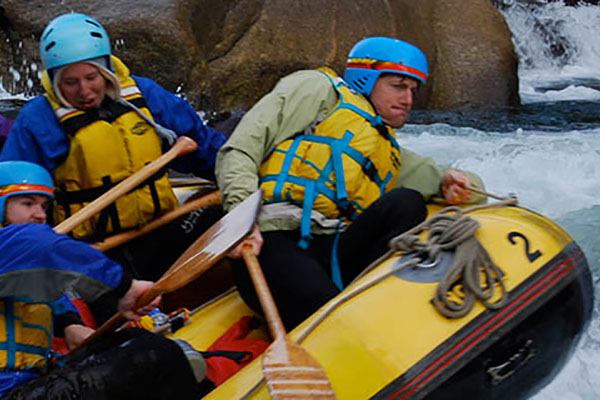
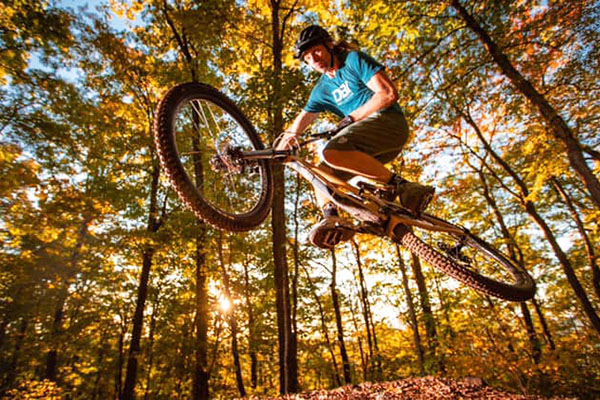

![How NCInnovation Is Rethinking Economic Development in North Carolina [faculty featured]](/_images/_posts/2026/02/rethinking-economic-development-600x400.jpg)









